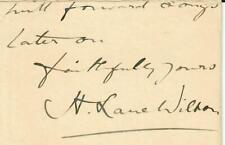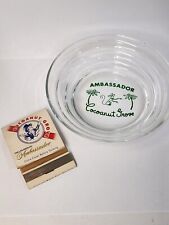RARE "Ambassador To Nazi Germany" Sir Nevile Henderson Signed 3X5 Card COA For Sale

When you click on links to various merchants on this site and make a purchase, this can result in this site earning a commission. Affiliate programs and affiliations include, but are not limited to, the eBay Partner Network.
RARE "Ambassador To Nazi Germany" Sir Nevile Henderson Signed 3X5 Card COA:
$489.99
Up for sale a RARE! "Ambassador To Nazi Germany" Sir Nevile Henderson Hand Signed 3X5 Card. This item is authenticated By Todd
Mueller Autographs and comes with their certificate of authenticity.
ES-3140
Sir
Nevile Meyrick Henderson GCMG (10 June 1882 – 30 December 1942) was a British
diplomat who served as the ambassador of the United Kingdom to Nazi Germany from 1937 to 1939. Henderson was born
at Sedgwick Park, near Horsham, Sussex, the third child of Robert
Henderson and Emma Caroline Hargreaves. His uncle was Reginald Hargreaves, who
married Alice Liddell, the
original of Alice in Wonderland. Henderson
was very attached to the countryside of Sussex, especially his home of
Sedgwick, and wrote in 1940: "Each time that I returned to England the
white cliffs of Dover meant Sedgwick for me, and when my mother died in
1931 and my home was sold by my elder brother's wife, something went out of my
life which nothing can replace". Henderson was extremely close to his
mother, Emma, a strong-willed woman who had successfully managed the estate at
Sedgwick after her husband's death in 1895 and developed the gardens of
Sedgwick so well that they were photographed by Country Life magazine
in 1901. Henderson called his mother "the presiding genius of
Sedgwick" who was a "wonderful and masterful woman if ever there was
one".
He was educated at Eton and joined the Diplomatic Service in 1905. He was,
as one historian notes, "something of a snob", although another
historian states that his snobbishness mostly derived from the death of his
mother. Henderson had a great love of sports, guns, and hunting, and
those who knew him noted he was always most happy when he was out on the hunt. Henderson
was also known for his love of clothing and always wore the most
expensive Savile Row suits and
a red carnation. He was considered to be one of the most best
dressed men in the Foreign Office, being obsessed with the proper fashion even
during long-distance rail voyages.
Henderson's obsession with his wardrobe, social etiquette, and hunting was part
of a carefully cultivated image that he sought for himself as a polished
Edwardian gentleman.
Henderson never married, but his biographer, Peter Neville, wrote that
"women played an important role in his bachelorhood did not cause questions about his sexuality; Baron Ernst von Weizsäcker, the
State Secretary of the Auswärtiges Amt, wrote
in his diary that Henderson was a "ladies' man". In the early 1920s,
Henderson was stationed at the embassy in Turkey, where he played an important role in the often
difficult relations between Britain and the new Turkish Republic. Henderson
had wanted a posting in France, rather than Turkey, where he constantly
complained to his superiors about being sent. During his time in Turkey,
Henderson played a major role in the negotiations about the Mosul dispute,
which had been caused by Turkish President Mustafa Kemal's claim to the Mosul region of Iraq.
Henderson was forceful in upholding the British claim to the region. but
was prepared to yield to Turkish demands for Constantinople. He argued that
Britain had been shown to have a very weak hand by the Chanak Crisis in 1922, which revealed that public opinion
in Britain and its dominions was unwilling go to war
over the issue. Henderson served as an envoy to France in 1928 to
1929 and as Envoy Extraordinary and Minister Plenipotentiary to the Kingdom of
Yugoslavia between 1929 and 1935. He did not want the
latter post, whose British legation was considered to be an unglamorous post,
compared to the "grand embassies" in Paris, Berlin, Rome, Moscow,
Vienna, Madrid and Washington. He had been lobbying for a major post in the
Paris embassy and, expecting to move back to Paris soon, continued to pay the
rent for his apartment there for some time after moving to Belgrade. During
his time in Belgrade, Henderson became a very close friend of King Alexander I of Yugoslavia,
who shared his love of hunting and guns. In January 1929, having been a
constitutional monarch, Alexander had staged a self-coup, abolished democracy and made himself the dictator
of Yugoslavia. Henderson had a strong tendency towards hero worship and found in Alexander a hero worthy of his
admiration who could do no wrong. Henderson's dispatches from Belgrade took on
a notably pro-Yugoslav tone. His friendship with Alexander notably increased
British influence in Yugoslavia, which first brought him attention in the
Foreign Office. As would be the case during his time in Berlin,
Henderson took exception to any negative remark in the British press about
Yugoslavia and wrote to the Foreign Office to ask if anything could be done to
silence such criticism.After Alexander's assassination in Marseilles, France, in October 1934, Henderson wrote: "I
felt more emotion at King Alexander's funeral than I felt at any other except
my mother's". Henderson wrote to a friend in Britain in 1935:
"My sixth winter in the Belgrade trenches is the worse of all. The zest
has gone out of it with King Alexander gone. It interested me enormously that made
all the difference".Henderson was also in close confidence with Prince Paul, the regent of
Yugoslavia on behalf of Alexander's son, Peter II, who was only a
boy. In January 1935, the Permanent Undersecretary at the Foreign Vansittart sharply rebuked him for a letter he
had written to Paul in which Henderson strongly supported Yugoslavia's
complaints against Italy. Vansittart complained particularly about Henderson's
claim that the Italian government supported Croat and Macedonian separatist
terrorists and that Italy had been involved in Alexander's assassination:
"Are we convinced of this and do we wish Prince Paul to think that we are
convinced of it". In 1935, Henderson became ambassador to Argentina. On 28 May 1937, Foreign
Secretary Anthony Eden appointed
Henderson to be ambassador in Berlin. After he had been prime minister, Harold Macmillan, wrote of that appointment:
View more great items

Related Items:
RARE "Ambassador to Mexico" Henry Lane Wilson Clipped Signature
$489.99
Old RARE Ambassador Hotel COCOANUT GROVE Night Club Ashtray and Matchbook Cover
$89.99
RARE "Ambassador to Greece" John Peurifoy 2 Page Hand Signed TLS Dated 1952
$209.99



